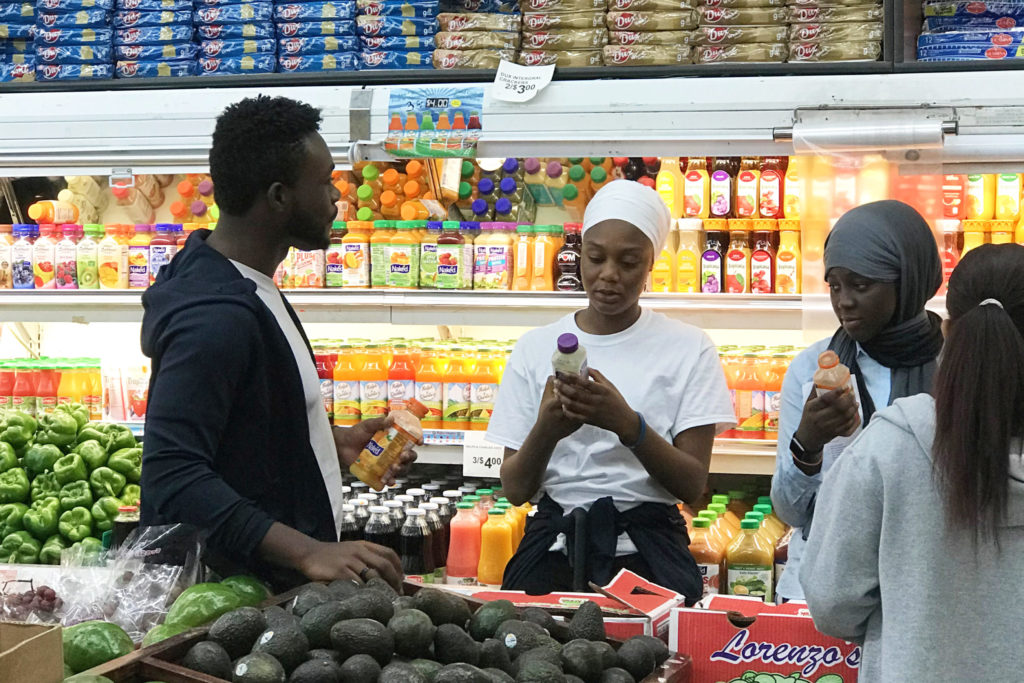
Evelyn Munoz is a dietetic intern at The Sylvia Center working on creating a food justice lesson plan for the Teen Culinary Apprenticeship Program. Her lesson will involve students investigating the layout of a grocery store. By taking a deeper look at what products are available and using their nutritional knowledge, students will participate in an ingredient scavenger hunt to create a healthy snack on a budget. It’s not easy to combat the issues of the food systems but education is a great tool to make more healthy decisions and shop smarter.
Q & A with Evelyn on Food Justice
What are you researching to learn more about food justice/to build the curriculum?
Throughout my research I am looking at articles that explain how various organizations are delivering food justice programs to young populations. Some organizations are using innovative projects to talk about food issues. Programs are implementing photovoice, food distributions, cooking demonstrations and food literacy curriculums to increase participant’s awareness about food injustice and food insecurity in neighborhoods. I am also looking at articles that describe the effectiveness of these food justice programs. Many articles have shown that teens care about their food and are interested in the topic of food justice. Other studies talk about the positive impact the programs have on the participants. These impacts include increasing awareness of the topic, developing leadership skills and empowering teens to engage other members of the community.
How does the food justice movement improve nutrition and health?
Programs that focus on food justice impact participants in different ways and promote health changes. This movement can also improve nutrition by helping prevent diseases such as childhood obesity. Childhood obesity is a serious health condition that continues to be a public health issue worldwide. The food justice movement provides participants with the knowledge necessary to increase awareness of the various factors that influence childhood obesity. It also allows participants to think about solutions related to these health problems. Participants that engage in food justice activities become community leaders and advocate for healthy food in their neighborhoods and schools. Through the food justice movement, participants are able to work with policy makers and create positive changes in food systems.
Why is it important to educate young people about the food systems? How does this empower teens?
Young people need to learn about food systems so that they know where their food comes from. This can be meaningful since they connect with other members of the community and learn about sustainable practices that are beneficial to the planet. Many young people become interested in making changes because they are able to see the value of a food system. Moreover, they realize that they play a much larger role than just consumers. As young people learn about food and how it grows, they begin to apply the framework to their everyday lives. In school, for example, they feel confident that they can change things they don’t like about their school lunch. At home, they influence family members to make healthier food choices.
How can young people get involved in the food justice movement?
Young people can become involved in the food justice movement simply by making different food choices. Whenever possible, they can try to select fruits and vegetables instead of processed foods and snacks. If they want to do more, they can work with local organizations to advocate for accessible and affordable food options in their communities. They can even work with city and school districts, policy makers and other companies to make changes in various areas of their neighborhoods. Most importantly, young people should work together to report food injustices. They can educate others about this topic which will create a stronger movement.
More from Evelyn…
Although I have heard of the term ‘food justice’ before, I had never done extensive research on the topic before. I am glad to see that many organizations nationwide provide programs that bring awareness to food injustices. These organizations not only provide education and resources, but they also provide hope that systems can change. I am excited to help The Sylvia Center build this curriculum and will work hard to create lessons that are helpful to the students. I won’t be able to see all the classes in action but I am looking forward to hearing about all the changes this curriculum will spark among the younger population.


